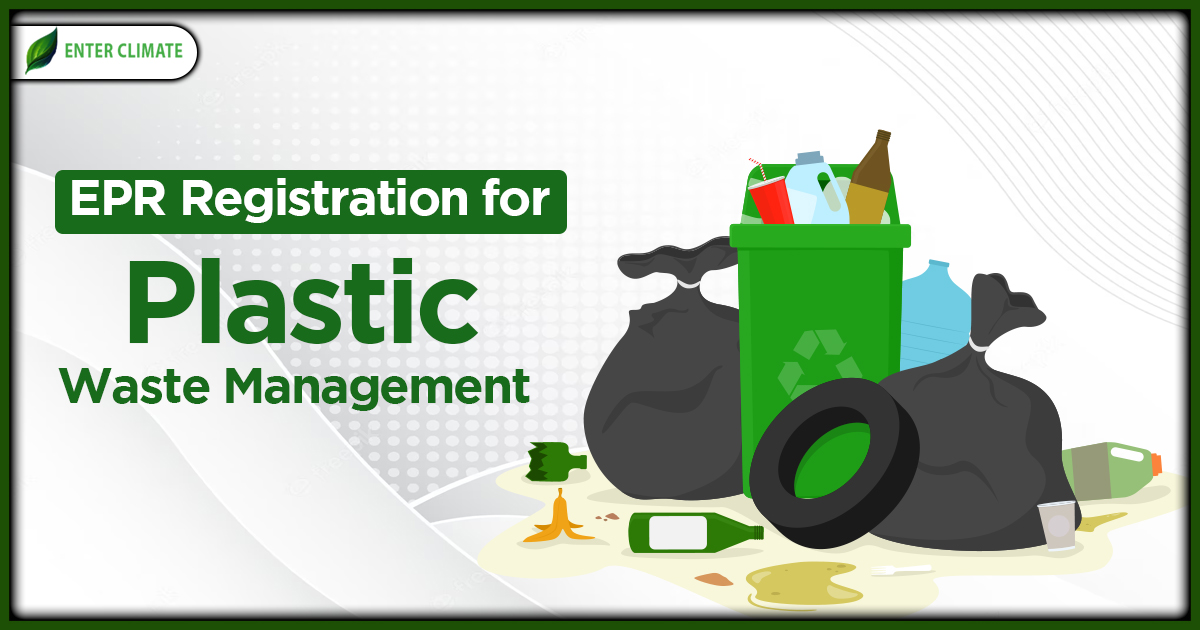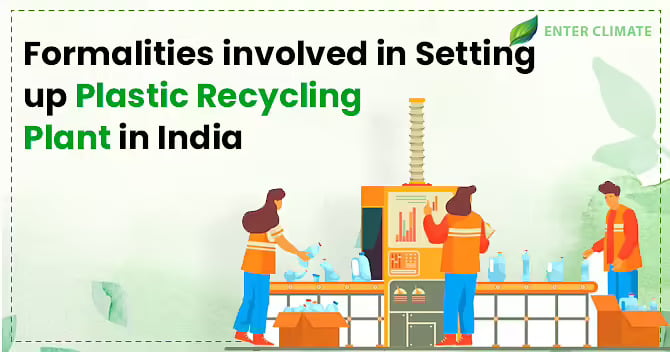EPR Registration for Plastic Waste Management (PWM)
 01 Sep, 2023
01 Sep, 2023 
Maybe you are a business owner who uses plastic to package the product and recently learned that the government wants you to register your business with something called EPR, short for extended producer responsibility. Or maybe you are registered under these rules but do not have a clear idea about how the EPR regime works and what the basis is on which your waste management obligations and targets are being identified. This article will not only answer these questions but will also explain the process of EPR Registration for Plastic Waste Management (PWM).
So, what exactly is EPR?
The Indian government implemented the Plastic Waste Management (PWM) Rules in 2016. In 2022, the EPR guidelines for Plastic packaging were notified by MoEF. Under these rules, manufacturers, importers, and brand owners (PIBOs) of products that use plastic packaging with their products, along with Plastic waste processors (PWP), are required to fulfil EPR obligations and ensure the collection, recycling and proper disposal of non-recyclable plastic waste generated from their products. PWPs include businesses involved in recycling/ reprocessing plastic waste, plastic waste for energy plants, plastic waste for oil production and industrial waste composting.
EPR obligations for producers and PWP include recycling a proportional weight of waste plastic as per their targets. They must establish collection systems, collaborate with local authorities and waste management agencies, and ensure the recycling or safe disposal of plastic waste. Moreover, EPR has guidelines to ensure recycling entities (co-processors/ recyclers/ WTE plants) perform eco-friendly recycling and disposal.
The EPR Registration for Plastic Waste Management applies to PIBOs that use 4 categories of plastic packaging (rigid plastic packaging, flexible plastic packaging, multilayered Plastic packaging and compostable plastic packaging). The PWM Guidelines have created a legal responsibility for PIBOs by defining EPR Targets for PIBOs and associated waste management obligations in the form of recycling/ co-processing/ disposal and any associated environmental impacts.
The recycling of both pre-consumer and post-consumer plastic packaging is mandatory. Pre-consumer plastic packaging waste includes rejects at the stage of manufacturing of packaging and plastic packaging waste generated during the packaging, including discard, before the packaging reaches the end-use consumer of the product, while post-consumer plastic packaging waste includes the waste generated after the intended use of packaging is completed by the end-use consumer and is no longer being used for its intended purpose
What does EPR Registration for Plastic Waste Management mean for your business?
The 2022 guidelines stipulate a mandatory EPR registration of these identified entities on a centralised CPCB portal, fulfilling their EPR targets, recycling packaging waste, reusing rigid plastic and recycled plastic content in their operation.
If you are a business that introduces a product in plastic packaging in the market in the four plastic categories (rigid, flexible, multilayered or compostable plastic), you will need to register for EPR and fulfil your category-specific recycling targets generated by the portal every year. The EPR targets will be based on the weight of plastic packaging used by the entity. You can collaborate with registered recyclers/co-processors/ and PWPs who can recycle proportionate plastic waste on your behalf, or you can purchase EPR certificates from registered recyclers. This can be done only through the portal.
But how will I identify my EPR Obligations?
To reduce the public costs of waste management and promote a circular economy, the government has made strict guidelines and monitoring mechanisms to implement the process of EPR Registration for Plastic Waste Management, which has become necessary for businesses falling in the above categories. So the first stage is to ask yourself which category your business falls into.
- A producer is an entity that is engaged in manufacture branding or import of multilayered packaging or carry bags or plastic sheets[1] and includes businesses or industries using plastic sheets, covers made of plastic sheets, multilayered packaging for wrapping or packaging of the commodity.
- Importer means a person who imports products with plastic packaging, plastic packaging products carries bags or multilayered packaging or plastic sheets or the like.
- A Brand Owner (BO) is a person or company that sells any commodity under a registered brand label or trade mark. Therefore, BO will also include online platforms/marketplaces and supermarkets/retail chains other than those that are micro and small enterprises as per the criteria of the Ministry of MSME, GoI.
- Plastic Waste Processors is the category that includes recyclers and other plastic waste recycling units, including those units that use plastic in waste to energy, waste to oil and in co-processing of plastic waste.
Now that you have identified which category your business falls into, the next step is to determine what your obligations are. Now for PIBOs, in addition to registering on the CPCB EPR Portal and obtaining an EPR Registration number, the business will also need to fulfil EPR compliances that include regularly fulfilling their EPR Targets, submitting quarterly and annual data to CPCB and maintaining records as specified by the Board in their EPR authorisation certificate.
Whereas in the case of PWPs, the entities will have to register themselves, follow the SOP for recycling/ disposal/co-processing and maintain and submit data of the activity to the CPCB and the concerned SPCB. They will also be required to generate EPR credits only for the waste they dispose of and maintain precise records of the recycling/ disposal.
Key takeaways for Businesses under EPR Registration for Plastic Waste Management
The CPCB, the nodal pollution control authority, is supervising the implementation of EPR in the entire country, along with the assistance of SPCBs/PCC. CPCB manages dedicated centralised EPR portals for online registration, generation of EPR Targets and trading of EPR credits between registered entities.
SBCB/PCC regularly bring out a list of entities (Exception Report) that have not fulfilled their EPR responsibilities annually and publishes it on their website. They also forward the Annual Reports submitted by PIBOs and PWPs in their jurisdiction to CPCB, who can then issue show cause notice for the defaulters, levy hefty environmental compensation and direct authorities for disconnection of essential public utilities to the facility.
How to proceed with EPR Registration for Plastic Waste Management
Step 1: The applicant must file for EPR Registration for Plastic Waste Management on the centralised CPCB portal along with the below-mentioned documents at the portal and an EPR Plan, including agreements that they have with registered waste collectors, recyclers/ PWP/ TSDFs/ ULBs. PIBOs that are operational in one or two states/UTs are also required to register with the concerned SPCB/PCC. In the case of EPR registration, you will need the following documents.
- Copy of the valid consent certificate,
- Company’s PAN, CIN & GST (the combined copies of GST invoices in all the States/UTs where the PIBO is operating), a
- Authorised person’s PAN & Aadhar,
- Details of the quantities of plastic packaging, etc.
Step 2: The CPCB will scrutinise the submitted documents and the feasibility of the EPR Plan and then only approve or reject the application. In case of incomplete applications or any issue flagged, the applicant will be given a timeframe to resolve them.
Step 3: CPCB issues EPR authorisation within 15 days of receiving the complete application. The EPR registration will be valid for 5years, after which it must be renewed.
How to fulfil Target after EPR Registration for Plastic Waste Management?
The recycling entities/ PWP/ Recyclers generate EPR credits for a particular plastic packaging category, which they can trade with the registered PIBOs. The Plastic Waste Management Rules lays down the modalities of how this trade can be done, the limitations and how to manage the liabilities arising from non-fulfilment of EPR Targets for each entity in the rules.
CPCB manages a centralised EPR plastic Portal, a centralised platform where PIBOs and PWP can generate, track record and trade their EPR targets and other EPR-related obligations. This whole platform is being monitored, and any shortcoming is easily detected due to the country-wide network of data that the Board is collecting. The online portal will also benefit those PIBOs that don’t have recycling facilities at their disposal, as they can trade for the EPR credits on the portal. The EPRportal works as a single-point data repository for registration, submission of data related to their operation/ trading of EPR certificates and submission of annual returns.
The PWM Rules also include the provision of heavy environmental compensation, surprise inspection by agencies, and cancellation of their CTO/ closure of the facility. So, being updated with the guidelines and timely data submission is of immense importance for a business. The responsibilities arising out of EPR Registration for Plastic Waste Management can, however, be delegated to EPR experts who not only help you fulfil your compliance but also connect you with a network of recyclers, co-producers and other producers and manufacturers on a pan-India level and also help you scale up your business.
Conclusion
EPR Registration for Plastic Waste Management has shifted the financial burden for waste management from municipalities and taxpayers to those producers and indirectly to the consumers who use these products. The producers, however, can include the added cost arising from the waste management in the product’s price so that the consumers of that product contribute to the recycling. In conclusion, registering for EPR and fulfilling the obligations is a crucial step towards reducing the environmental impact of plastic usage and promoting sustainability in manufacturing. These are the two elements that can decide the growth of businesses today. By taking responsibility for the waste generated by their products, PIBOs can work towards a cleaner and healthier planet for generations to come. Let us do our part and make a positive change today.
FAQs
EPR for Plastic Packaging provides the legal obligation for registration of PIBOs and PWPs in accordance with EPR Guidelines and responsibilities related to plastic waste recycling under the PWM Rules.
The Producers, importers and brand-owners that deal in plastic packaging in the plastic industry are mandated to register the business with CPCB and fulfil annual waste management targets as part of their EPR obligations.
EPR is a policy that defines the responsibilities related to waste management for producers, manufacturers, and importers of certain products
With respect to plastic packaging, the EPR guidelines cover the reuse, recycling, use of recycled plastic content and end-of-life disposal by PIBOs (producers, importers and brand owners.
EPR is a globally recognised waste management framework that ensures that producers of a product are held accountable for the entire life cycle and, finally, their disposal. EPR shifts the responsibility of waste management to the producers and also incentivising them to design their products with sustainability in mind
EPR is a policy framework that holds producers of a product responsible for the entire product lifecycle, including their disposal.
EPR registration offers numerous benefits for both the business and the environment, including
· Environmental Impact Reduction
· Promotion of Circular Economy
· Compliance with Regulations
· Economic Opportunities for Producers
· Brand Reputation and Consumer Confidence
EPR action plan is a detailed description of the collection, recycling and disposal methods and practices the applicant will implement to achieve its mandated target under Plastic Waste Management.
Producers, Importers & Brand Owners have to register through the online centralised portal developed by the CPCB.
Read our Article:EPR Authorisation for Plastic Waste Management.













